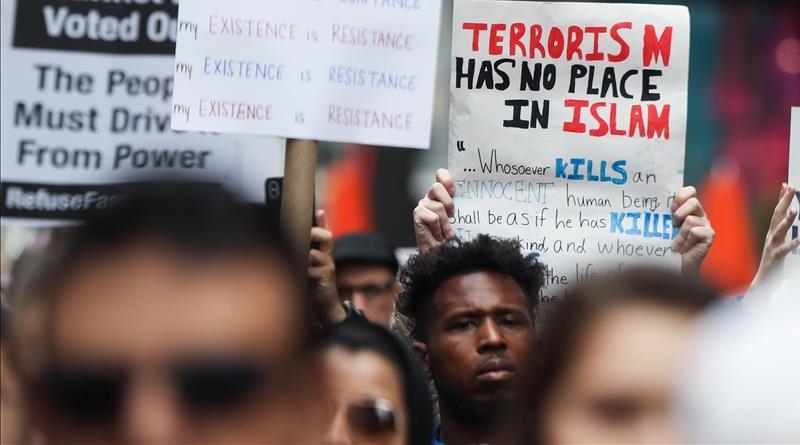
ISTANBUL
The discourse of battling "political Islam," used widely by European governments in recent years, has left the Muslim communities of these countries in the crosshairs.
Muslims have suffered limits to their fundamental rights, introduced under the guise of measures against "political Islam" in Austria, "legalistic Islamism" in Germany, and "Islamic separatism" in France.
Farid Hafez, a political scientist currently at Georgetown University in the US, told Anadolu about how Muslims are marginalized and criminalized with this new language frequently used in Austria, Germany, and France.
Hafez argued that the concept of opposing political Islam was based principally on disintegrating independently organized Muslim civil society that is not reliant on the state.
The notions of "political Islamism," "legalistic Islamism," and "Islamic separatism" are all variations on "one and the same concept," he argued.
To circumvent allegations of violating religious freedom, authorities in these three European countries avoid speaking out directly "against Islam," but rather against "political Islam," Hafez underlined.
This way, they can do such things as introduce discriminatory legislation and crack down on certain parts of the Muslim community, while saying they are not attacking Islam and "really only want to go against the bad (Muslims)," he explained, adding that they also claimed to seek to "protect the vast majority of Muslims."
Hafez said the paradigm shift in Austria that framed Islam as a threat began in 2011, when Sebastian Kurz became the country's first integration secretary at the Interior Ministry, with the policies that Kurz later implemented as chancellor in 2017-2021 being predicated on the "political Islam" discourse.
"This terminology is used in a very irresponsible way and it is a means to circumvent any potential attacks of violating religious freedom," he said, referring to the way such measures as bans of headscarves for Muslim women and the closing of mosques are explained by officials claiming they are "symbols of political Islam."
He pointed to Operation Luxor in Austria, where police raided 35 homes in 2020 and more than 105 people became suspects of "terrorism."
"This police operation was allegedly going after terrorists, and that was like the legal basis for that kind of operation."
"Those people hit by that operation were mostly people from the Muslim civil society or critical voices, like myself, who were critical of the Islam-related politics of the Austrian government," he elaborated, with authorities freezing the assets and bank accounts of the people affected, who became "marginalized subjects within the Austrian landscape."
Some, including Hafez, left the country. "I went to the US and there are other people who also left the country because their businesses and everything were destroyed and they had no more ability really to continue their normal lives.
"So, that was made impossible. And you know, you could guess that this was also one of the aims of the government to basically chase those people out of the country. And, they definitely succeeded in that sense," he added.
Invented by German intelligence: 'Legalistic Islamism'
Turning to Germany, the political scientist noted that the notion of "legalistic Islamism" was invented by the German intelligence agency, which basically see all forms of "Islamism" as a problem.
One of the outcomes of it was that intelligence forces included Muslim associations in their annual reports, he said.
"Once, in Germany, you are being surveilled and this is made public ... it has serious implications. Like for instance, you don't get state funds. Also people will shy away from joining those kinds of movements because potentially they won't get a job and some people were stripped of their citizenship, for instance. Some people were not able to get certain jobs," explained Hafez.
He added that the implementation and invention of legalistic Islamism and the central role it had within the German intelligence agency "really destroyed the lives of individuals, but also, more important, it tried to crack down Muslim civil society activism."
"So in a way, the message that was sent from the intelligence agency was: 'Better not organize. And if you organize, organize according to our rules. But don't be a self-organized Muslim agent who has its own independent thinking and ... way of dealing with certain issues."
On France, Hafez emphasized that the previous government of President Emmanuel Macron developed the concept of "Islamist separatism" alongside an initiative to create a local "French Islam" -- a goal shared with the other two countries as well.
He stressed that France had been attempting to control its Muslim population for the last three decades and that, by introducing his plan to fight "Islamist separatism," in October 2020, Macron further escalated anti-Muslim sentiment in the country.
Hafez drew attention to the Macron administration's policy of systematic blocking, which included the establishment of 101 government units across the country to monitor Islam and Muslims, the blacklisting of approximately 25,000 Muslim organizations and businesses under strict surveillance, and four schools. As a result, almost 700 Muslim-owned facilities and companies, including 37 mosques and 210 businesses, were forced to close.
"All of these measures have created huge damage that could be felt on the ground."
Anadolu Agency website contains only a portion of the news stories offered to subscribers in the AA News Broadcasting System (HAS), and in summarized form. Please contact us for subscription options.




